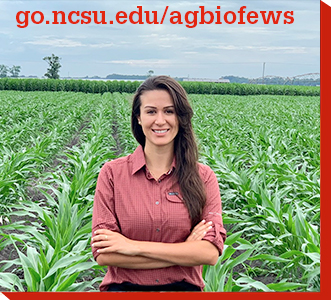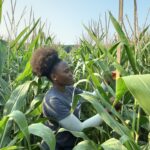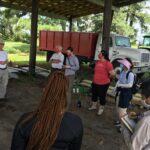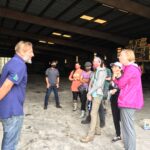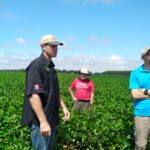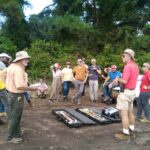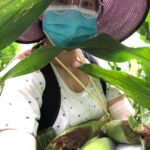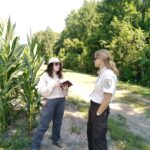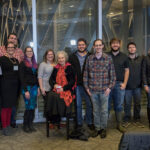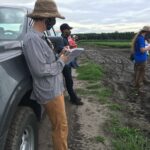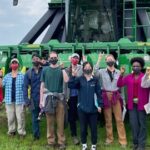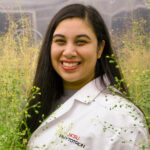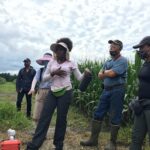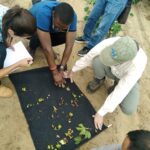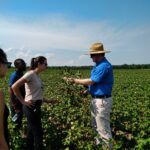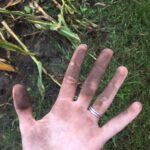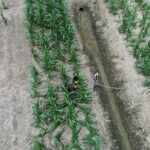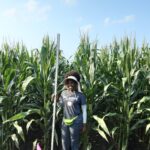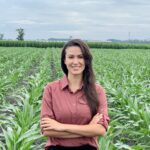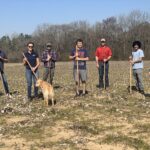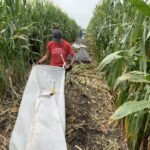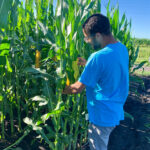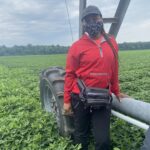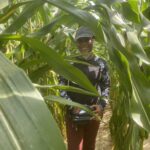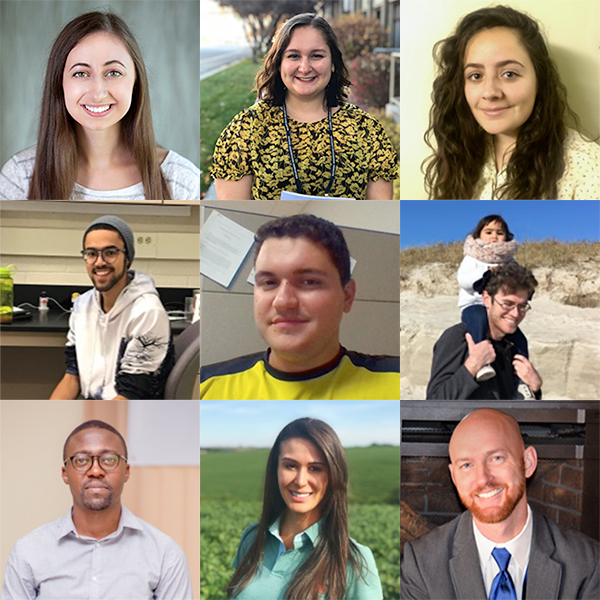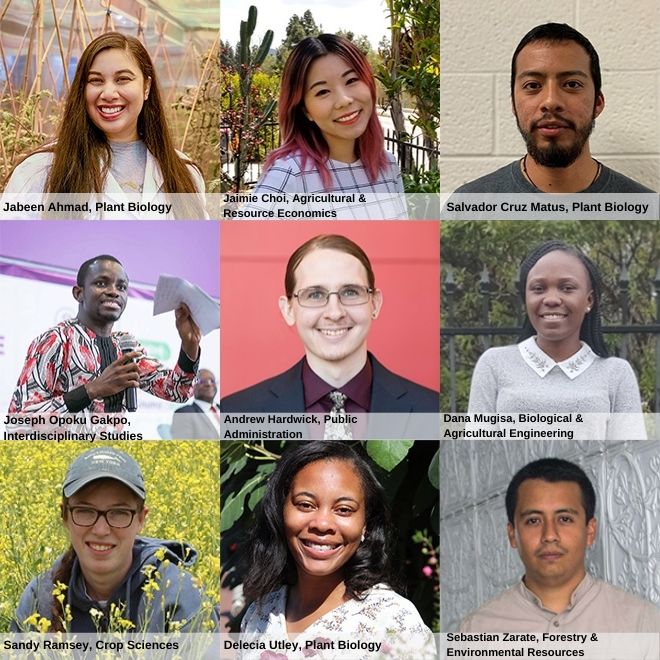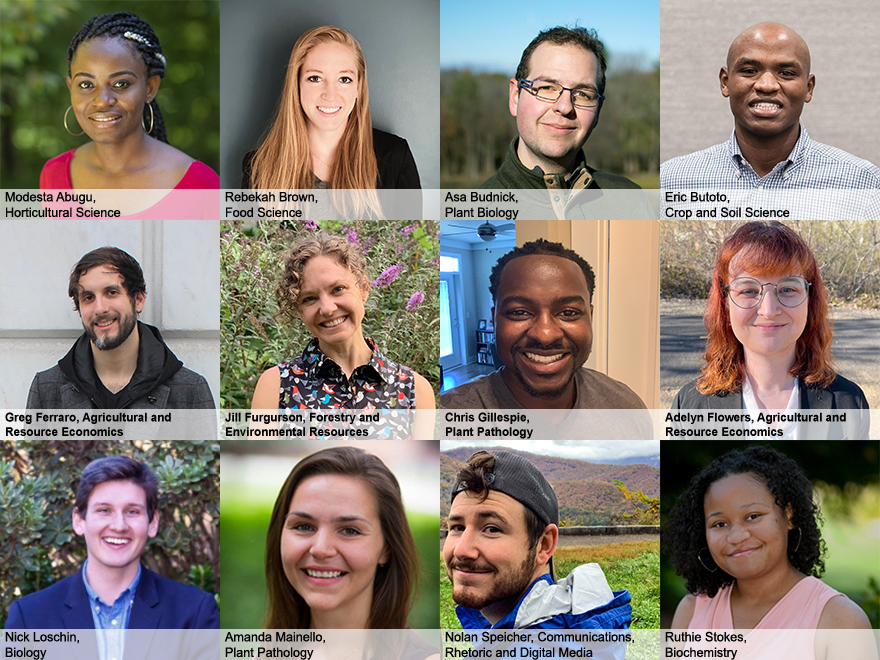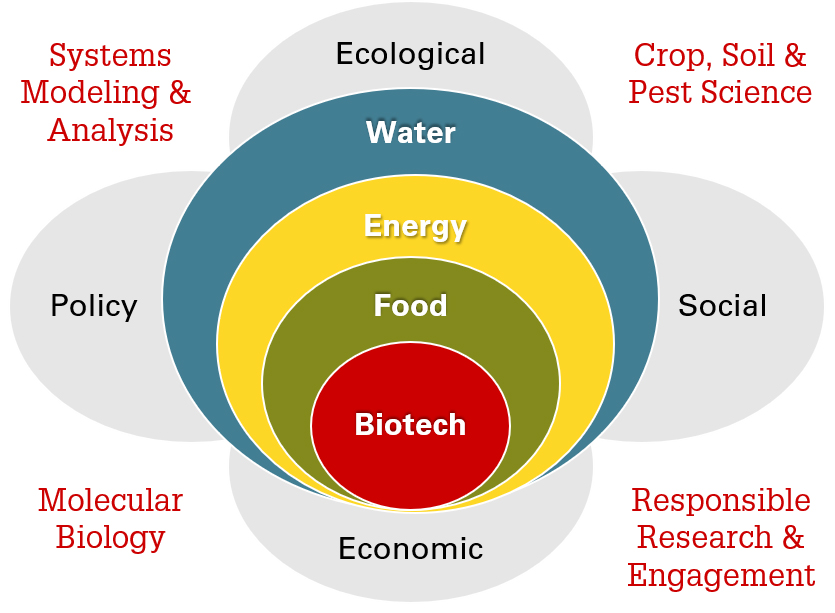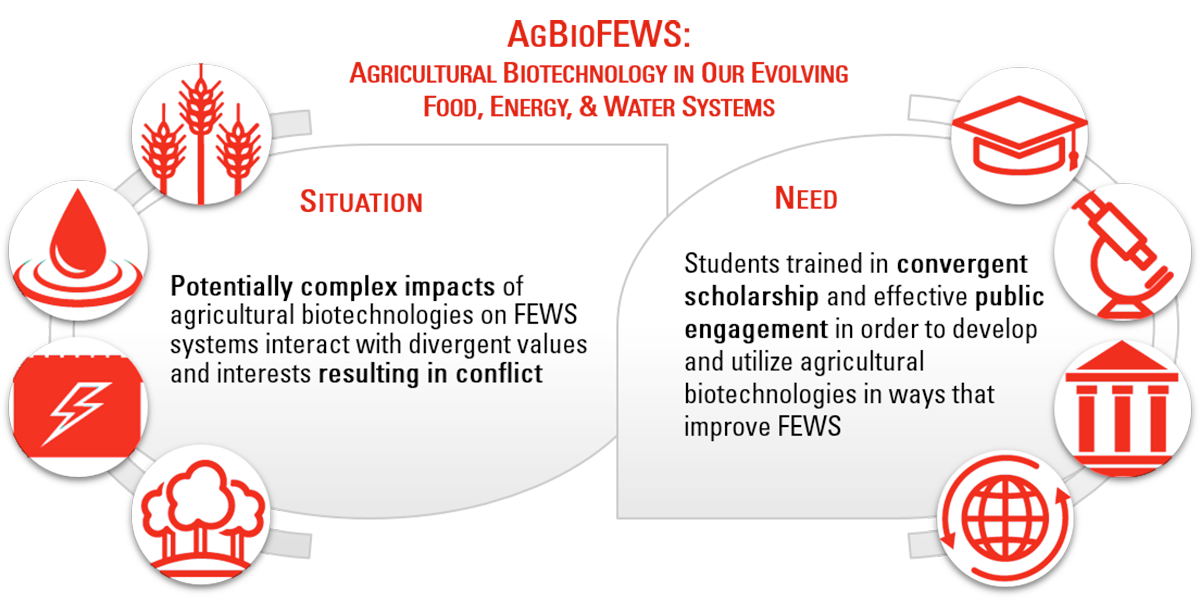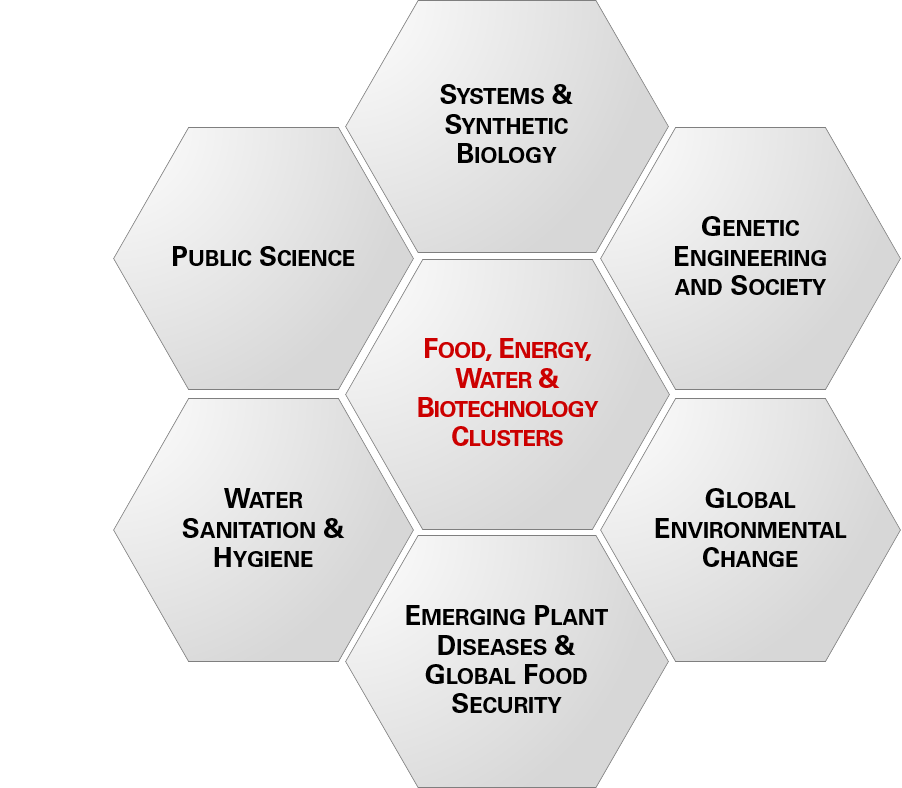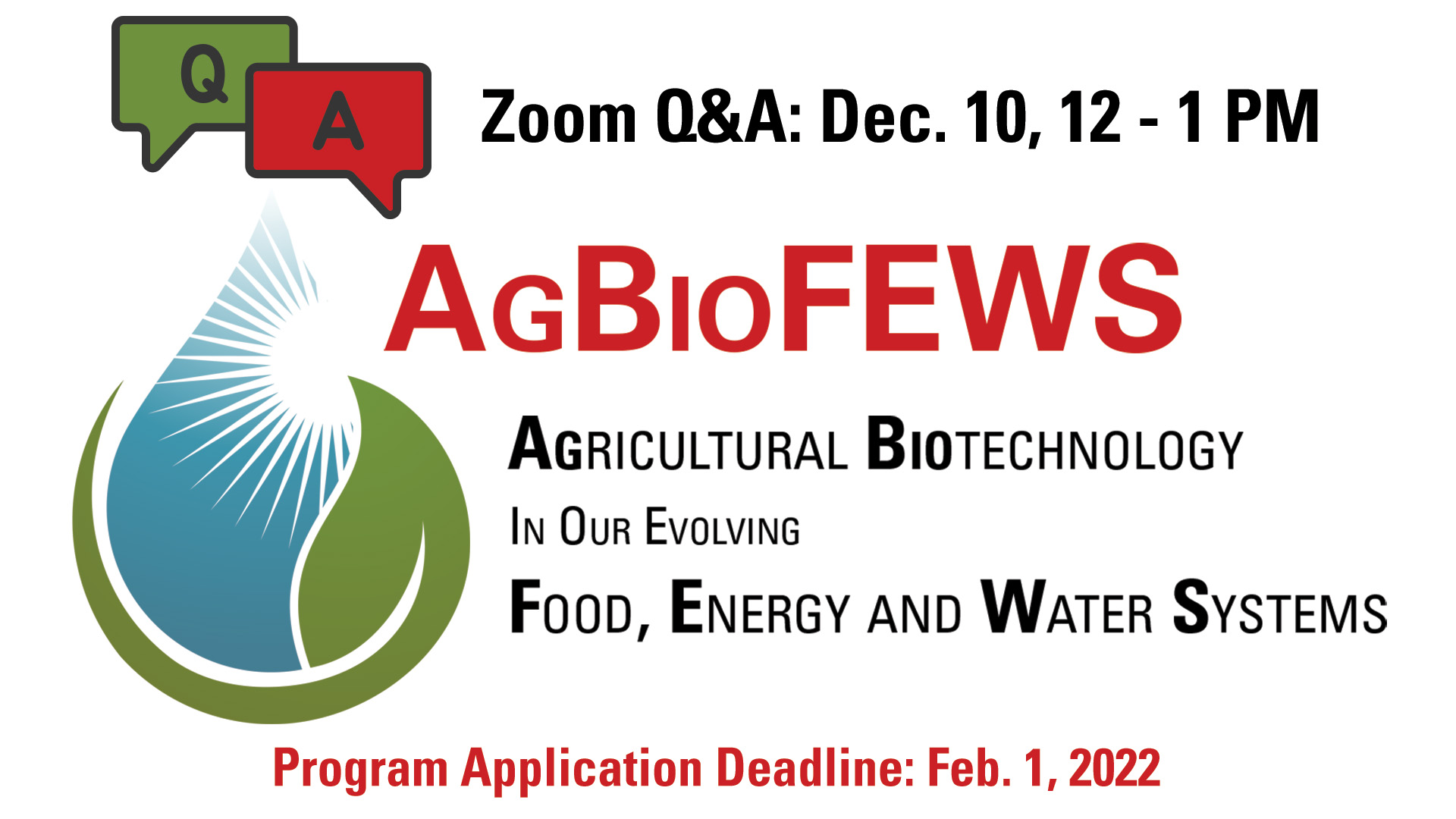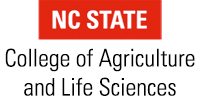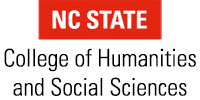Interdisciplinary NSF Research Traineeship:
AgBioFEWS
Agricultural Biotechnology In Our Evolving Food, Energy, and Water Systems
AgBioFEWS is a National Science Foundation-funded graduate research training program offering Ph.D. candidates across multidisciplinary fields of study the opportunity to examine the science, policy, and public engagement aspects and impacts of Agricultural Biotechnology on Food, Energy, and Water.
Program Fellows receive a Ph.D. in a natural/social science, or humanities graduate program (see options), and a graduate minor in Genetic Engineering and Society, and will:
- Receive two years of of $34,000 NSF-funded stipends, with continuing funding provided by their graduate programs
- Embark on their studies embedded with NC farms, with later opportunities for international internships
- Collaborate on an interdisciplinary cohort project
- Take advanced interdisciplinary graduate courses and incorporate AgBioFEWS into thesis
Student Experience
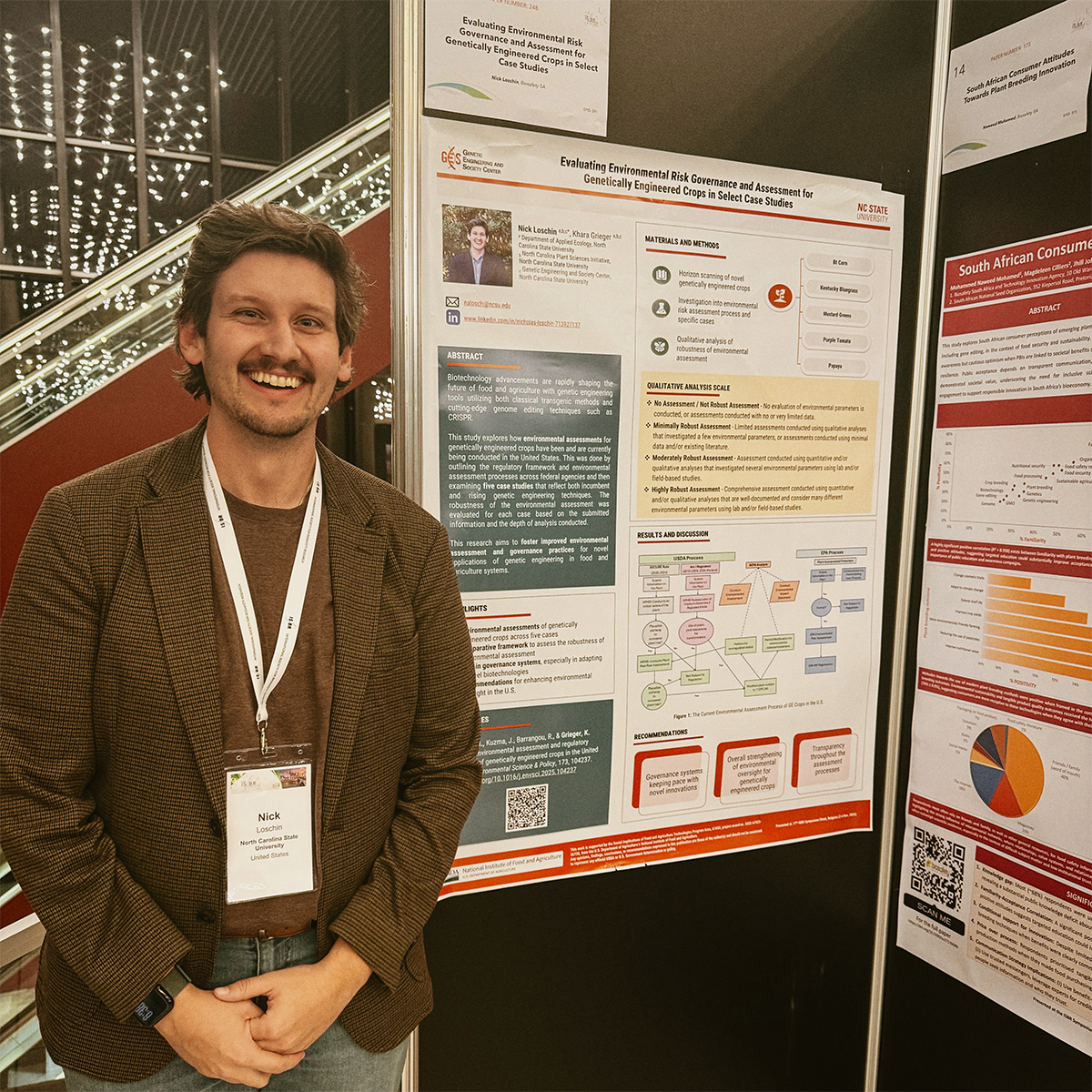
Blog: From Genes to Governance: Reflections on the ISBR Symposium in Ghent
Nick Loschin | At ISBR 2025, scientists and regulators grappled with gene editing, governance, and the path toward responsible innovation.

Blog: Crossing Boundaries: Risk, Resilience, and Emerging Technologies in a Global Context
GES Scholar Nick Loschin and Executive Committee member Dr. Khara Grieger traveled to Norway and Denmark this summer to share research on emerging technologies, highlighting how global collaboration, cross-boundary dialogue, and responsible innovation are essential for navigating risk and resilience in an increasingly complex world.

Blog: Beyond Innovation: Putting Humanity at the Heart of Biotechnology
Modesta Abugu | Attending the 2025 Spirit of Asilomar Conference shifted my scientific perspective profoundly—highlighting the urgent need to center ethics, equity, and human values in biotechnology.

Fred Gould: Lessons in Science and Humanity
April 2, 2025 | Colleagues and former students credit renowned NC State University scientist Fred Gould for teaching them about life as well as science.
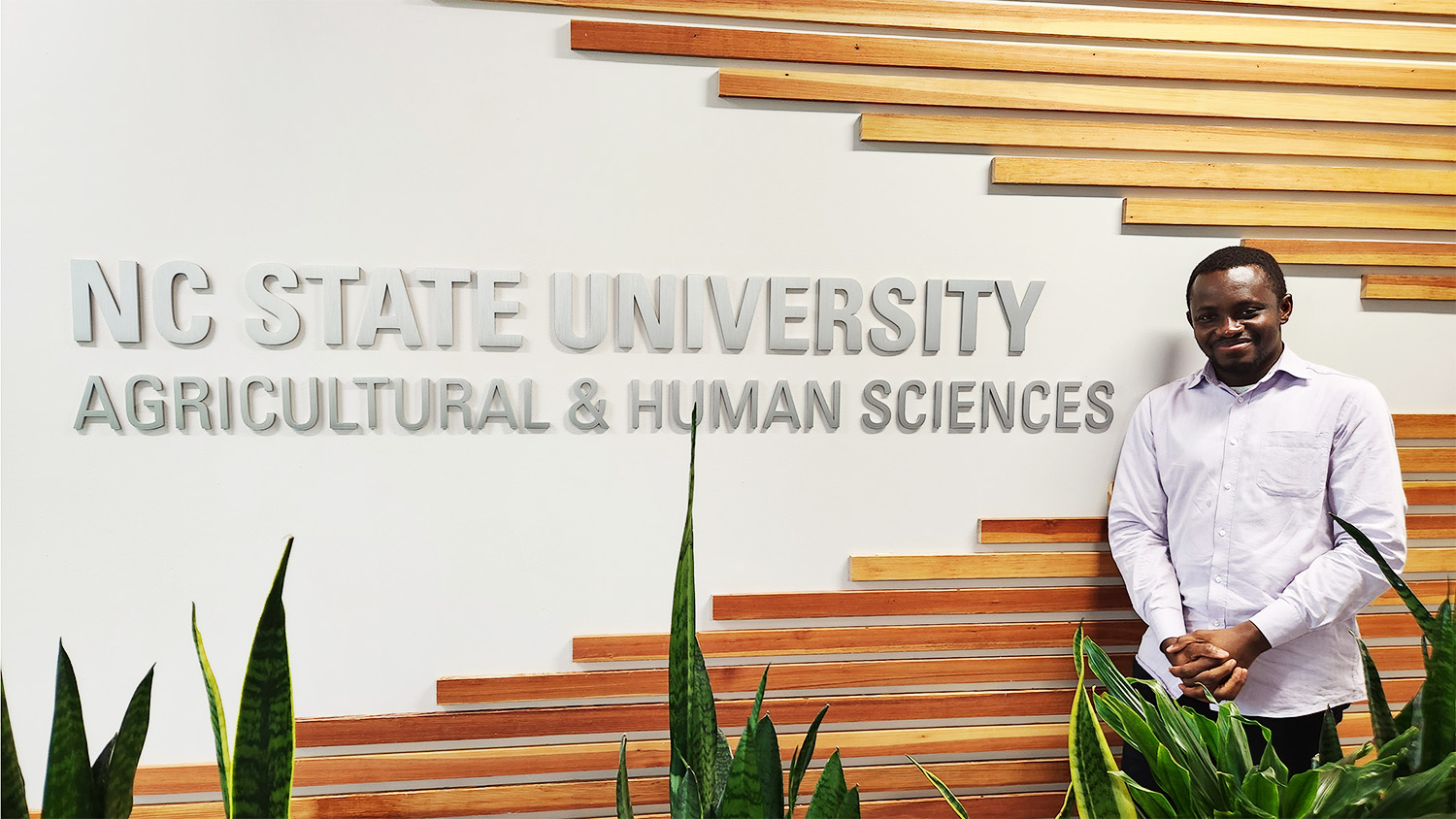
Advancing Agriculture
With a background in journalism and a passion for agricultural development, NC State doctoral student Joseph Gakpo hopes to leverage his education to make a difference in his native Ghana.
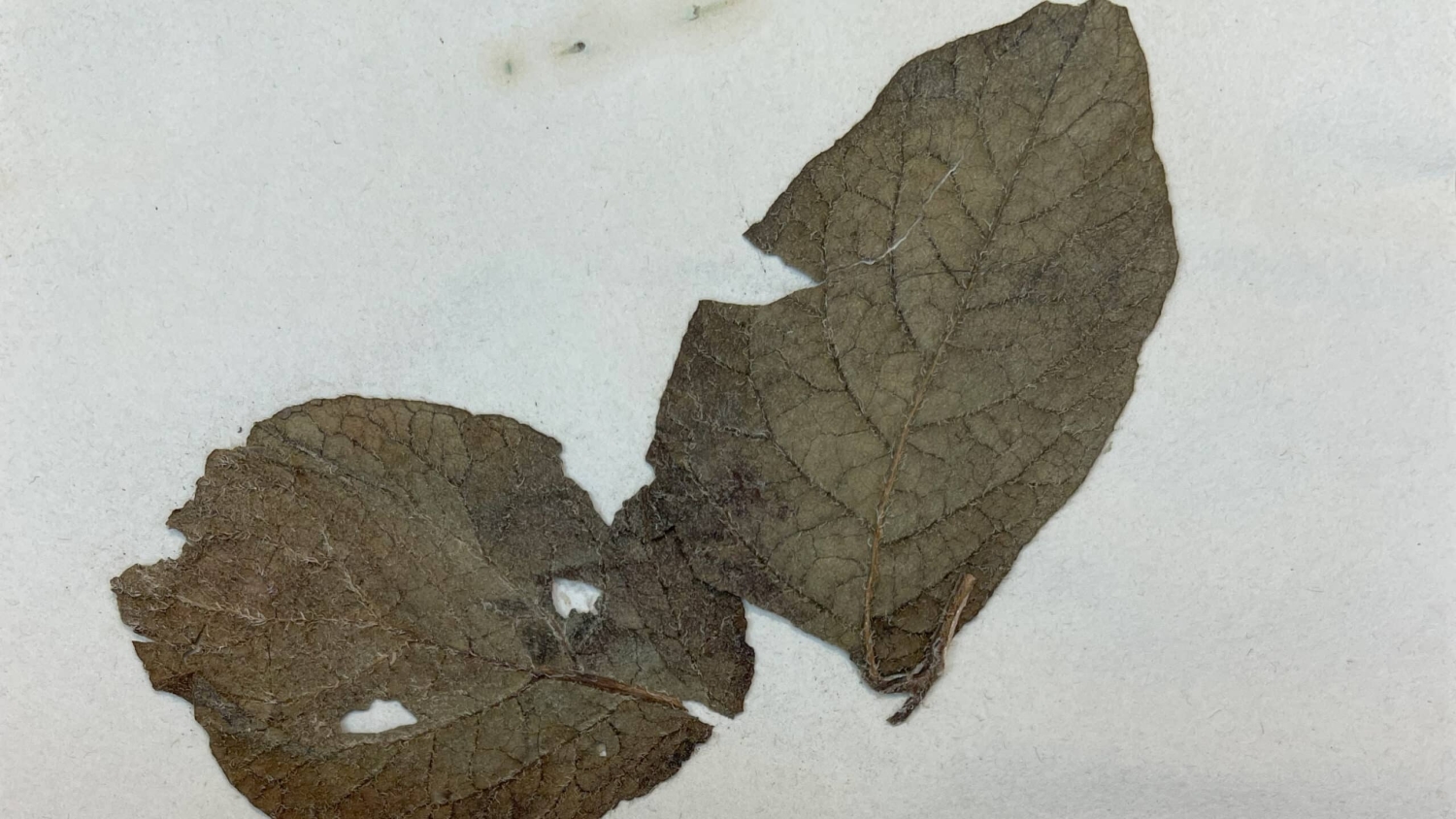
Study Analyzes Potato-Pathogen ‘Arms Race’ After Irish Famine
Researchers examine both the pathogen's effector genes and the plant's resistance genes simultaneously in a first-of-its-kind analysis.

Blog: “To the USDA, and Beyond!”: The Intersection of Governance and Biotechnology Innovation
Christopher J. Gillespie | Recently, on National Agriculture Day, Dr. Jennifer Rowland, the Biotechnology Coordinator at the United States Department of Agriculture (USDA), gave a talk at the GES Colloquium that left a “big footprint”.
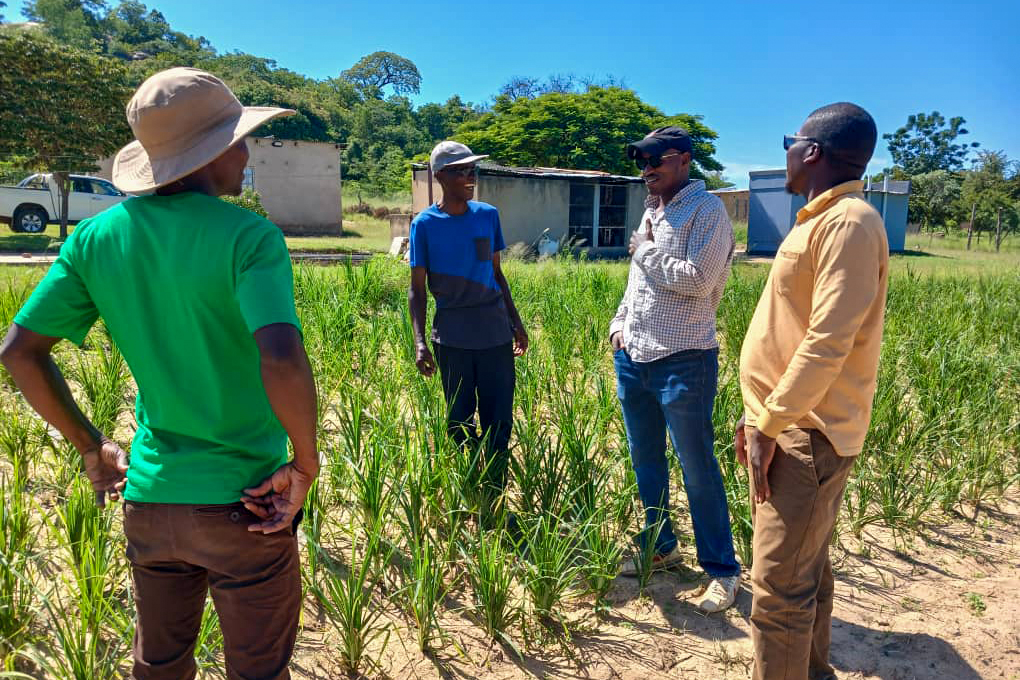
Blog: Grappling with complexities of smallholder farmers in Zimbabwe
Eric Butoto | Embarking on a three-month journey with CIMMYT in Zimbabwe, I delved into the heart of smallholder agriculture, witnessing firsthand the challenges, innovations, and unwavering resilience of farmers, offering a glimpse into their lives and the quest for food security in a changing climate.

Blog: Science Ideology and Policy: Eugenics in the South
Ruthie Stokes | In the annals of history, the American South has been marked by a complex tapestry of culture, tradition, and struggle. Yet, amidst the backdrop of rural landscapes and Jim Crow laws, there lurked a shadowy chapter: the era of eugenics.
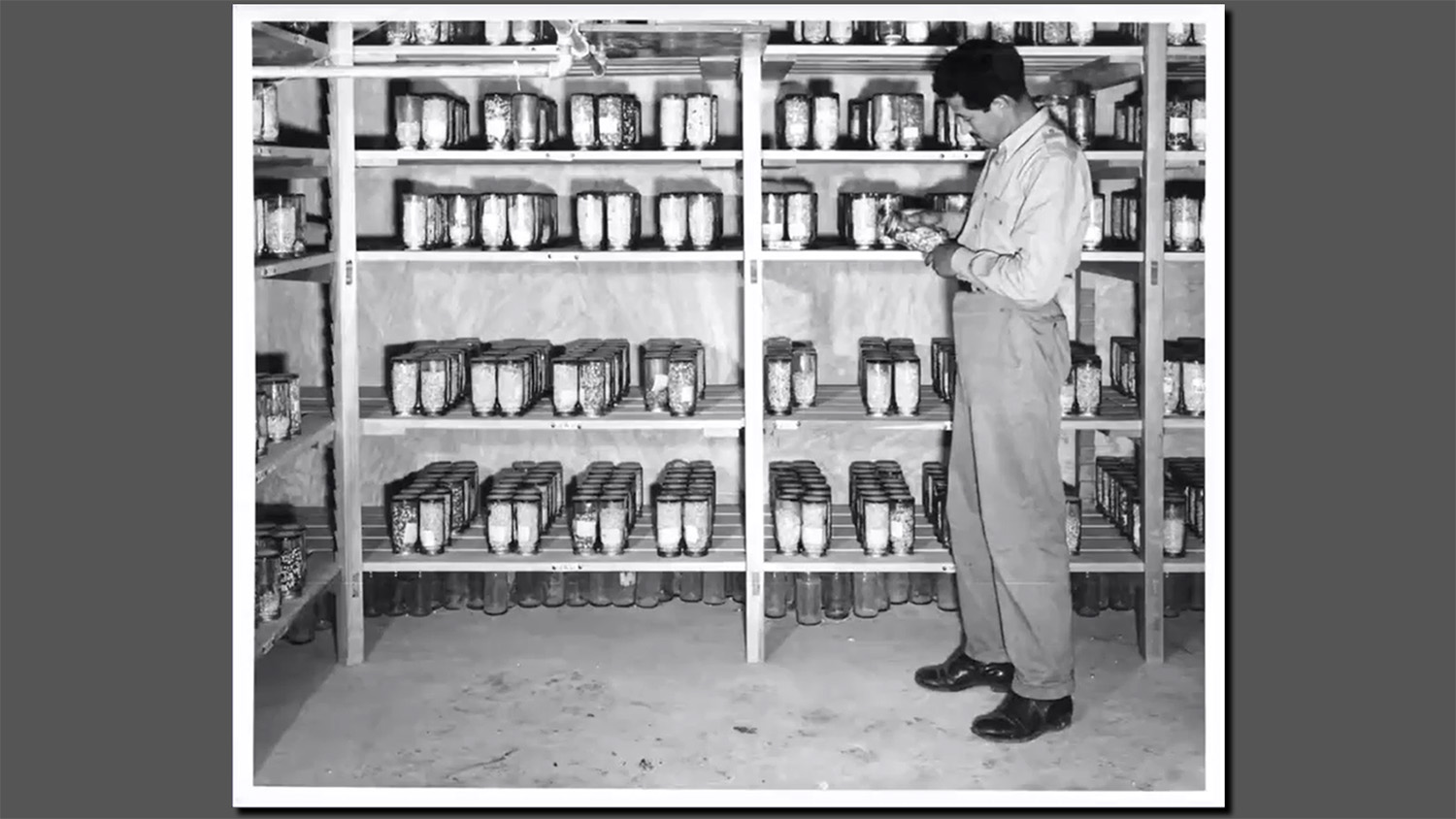
Blog: Saving Our Seeds, Changing Our Perspective
Asa Budnick | The act of saving a seed holds varied meanings, from my perspective as a molecular biologist, refrigerating seeds for experiments, to the broader perspectives of farmers, breeders, and nations, reflecting the diverse value and conservation methods of seeds, as explored in Dr. Helen Anne Curry’s discussion on seed conservation history and its intersections with scientific, imperialistic, and agricultural narratives.

Blog: Bringing in Indigenous Perspectives on Synthetic Biology for Conservation
Jill Furgurson | Dr. Kirsty Wissing's colloquium presentation highlighted the essential role of Indigenous participation in shaping conservation agendas, advocating for approaches that honor traditional ecological knowledge.
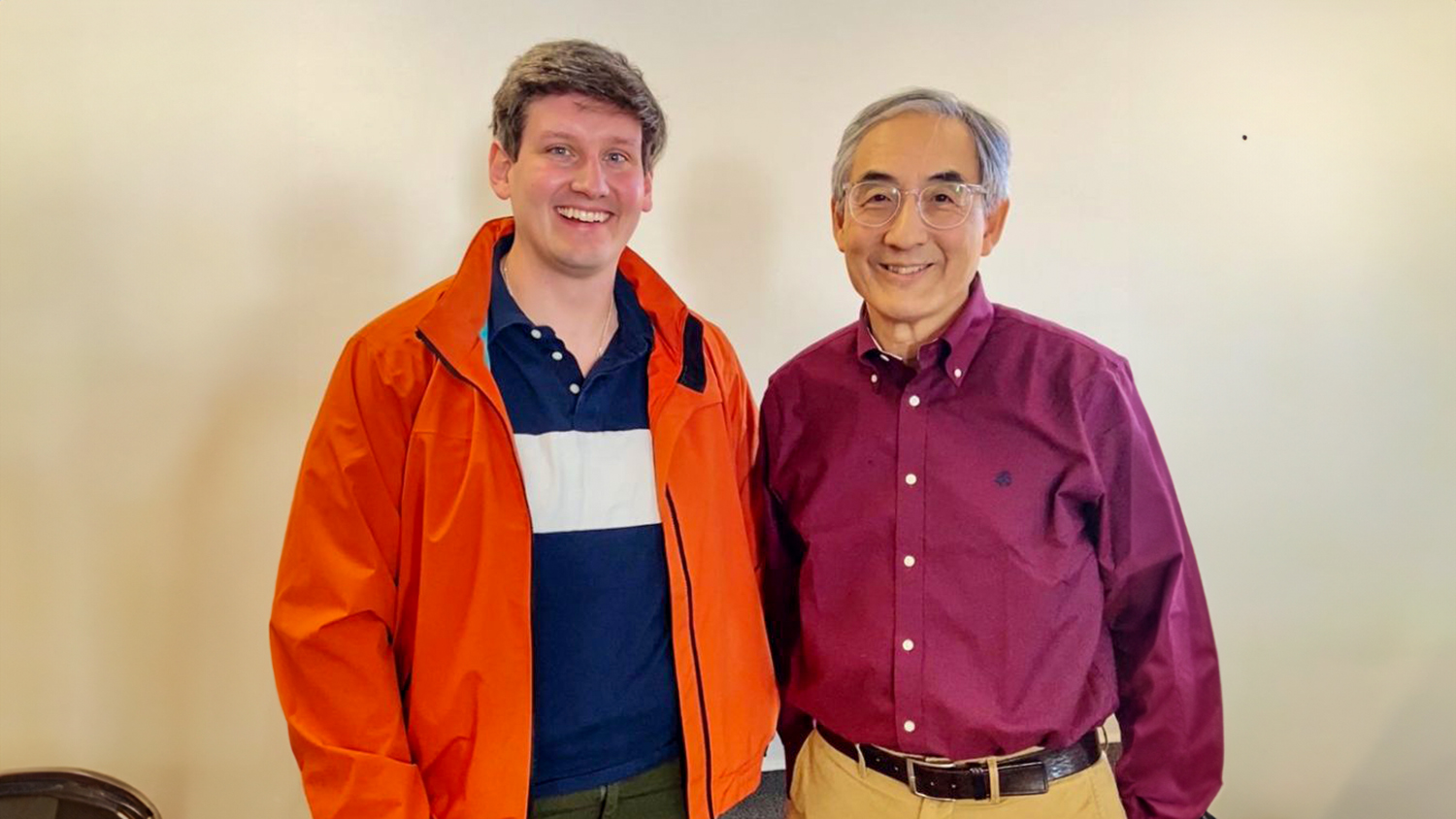
Blog: Key Ecological Perspectives: Tracing the Evolution of GMO Oversight with Dr. David Andow
Nick Loschin | Dr. David Andow provided his insights and expertise on ecological and evolutionary perspectives related to genetic engineering through key events from the 1980s to the early 2000s
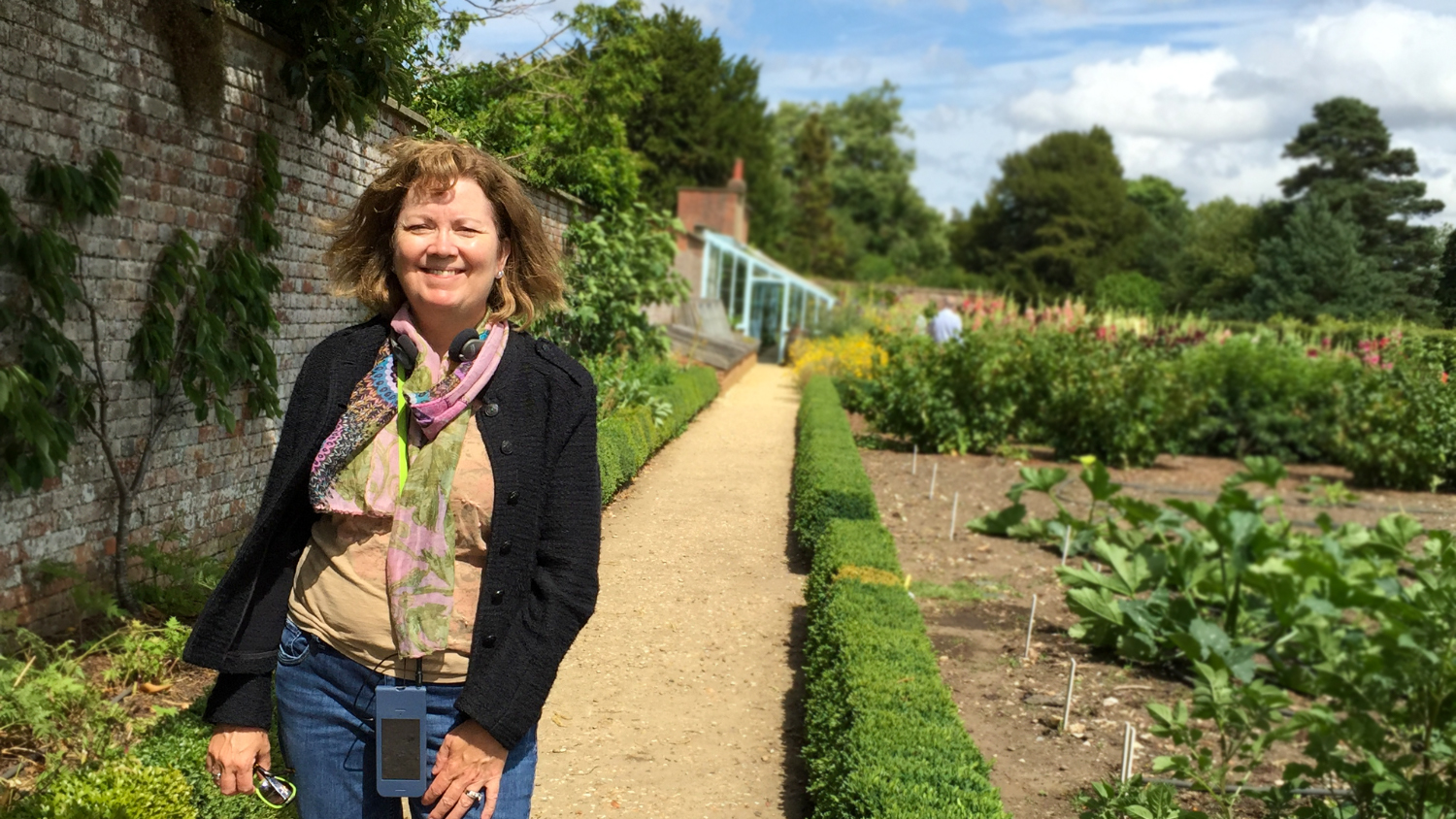
Preventing the Next Plant Plague
NC State's Jean Ristaino will write a book on her Irish Potato Famine research and work to prevent future plant disease outbreaks while in Dublin as a Fulbright scholar.
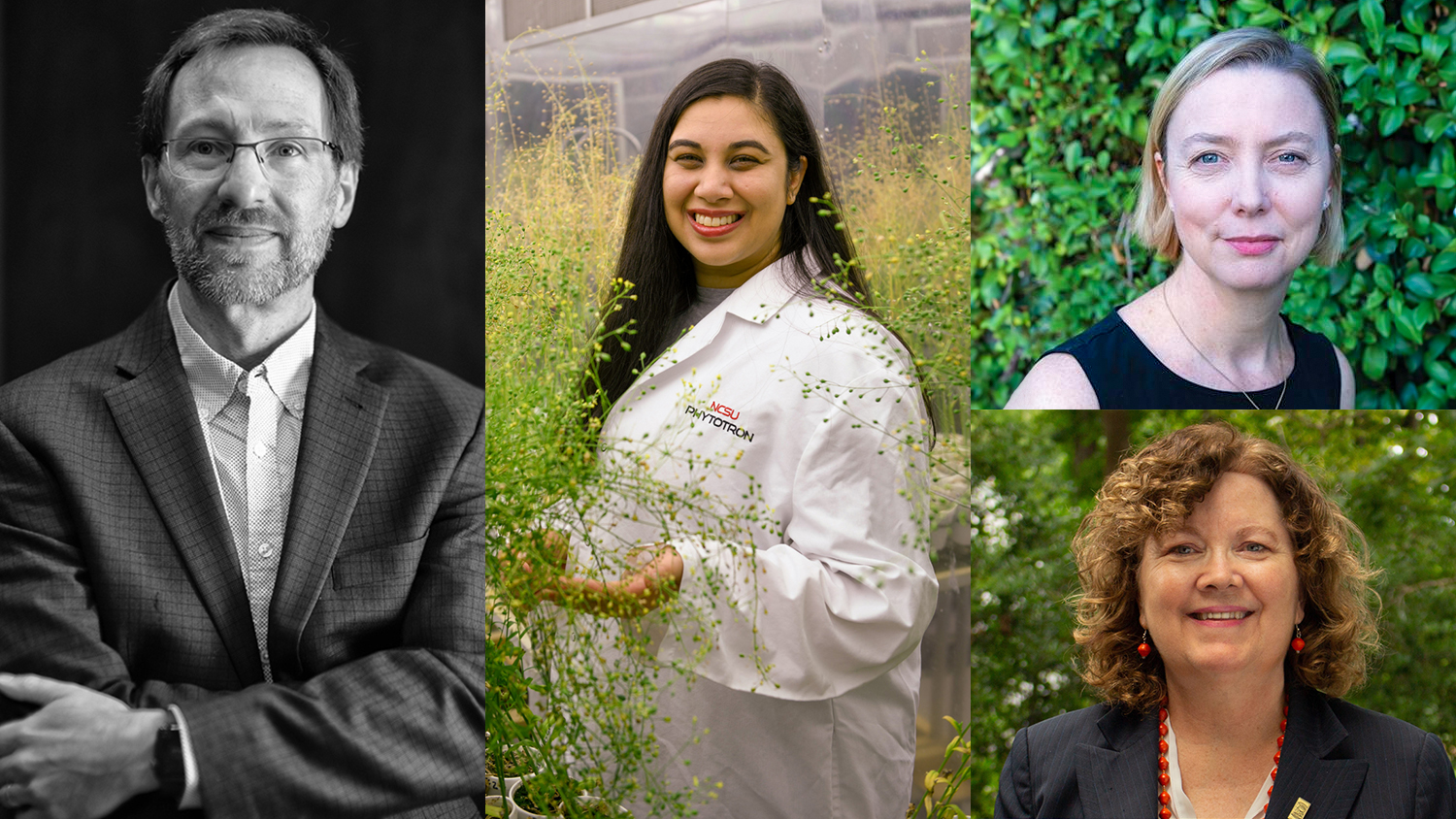
NC State Named a Fulbright Top Producing Institution
NC State has been recognized as one of the universities with the highest number of students, faculty and administrators selected for both the U.S. Fulbright Student and Scholar Programs, including three GES faculty members and an AgBioFEWS Fellow in 2023–24.

Blog: Remembering 20th Century Eugenics in North Carolina
Nolan Speicher | In a recent GES colloquium, PhD student Grace Wiedrich shared archival research that invites audiences to reflect on the eugenics movement and its intersections with our local history.
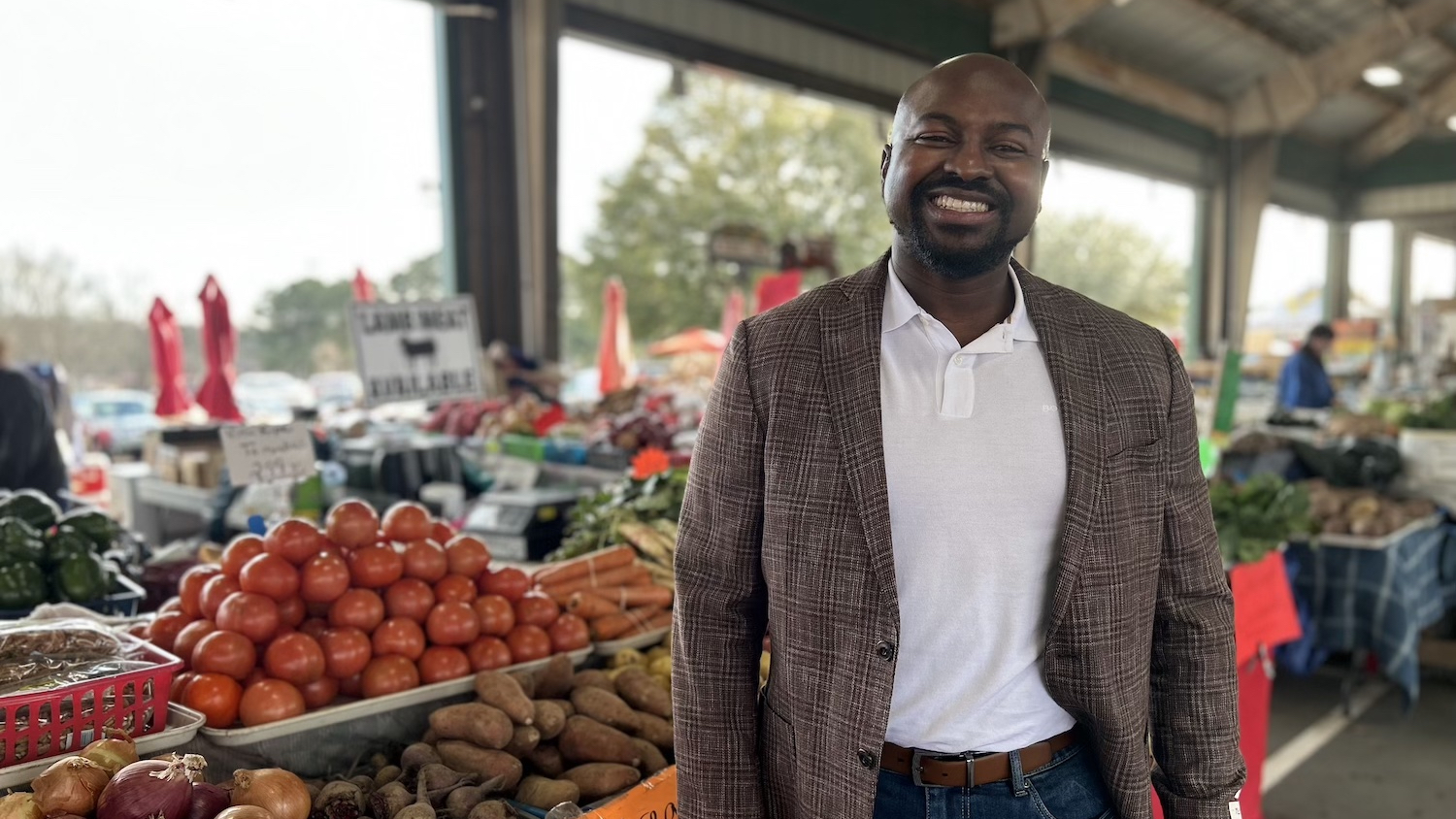
Envisioning a More Equitable Food System
Doctoral candidate and AgBioFEWS Fellow Christopher Gillespie seeks a stronger, more racially equitable food system, and at NC State, he’s taking steps to achieve that.
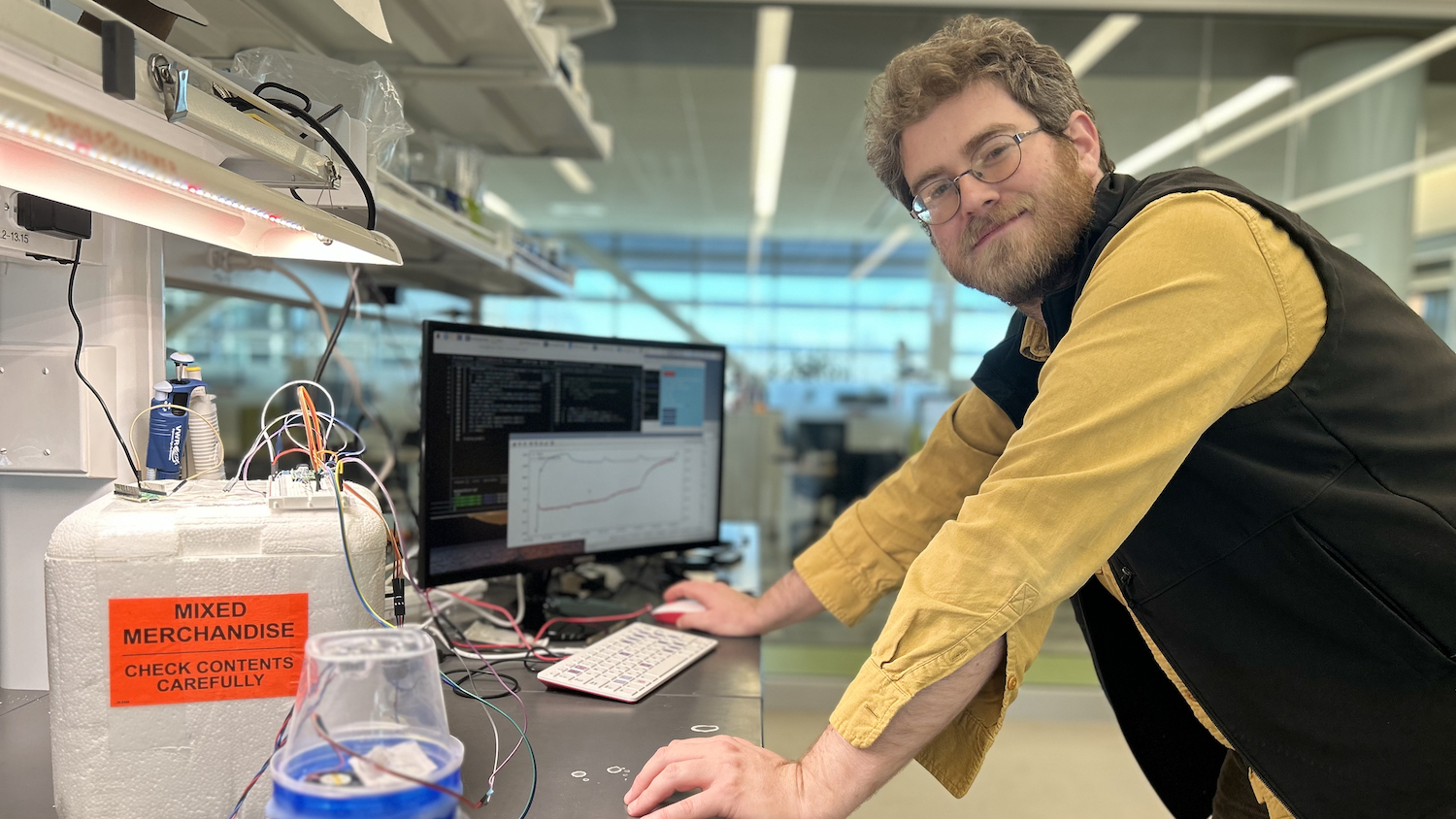
Starting Strong
The first small companies to join the startup program are pursuing diverse products aimed at solving different agricultural problems. For example, Eli Hornstein, who holds a Ph.D. from NC State in plant metabolic engineering, has started Elysia Creative Biology to help slow climate change by producing bioengineered crops that can be turned into feed that reduces the emission of methane, a greenhouse gas, from cows.
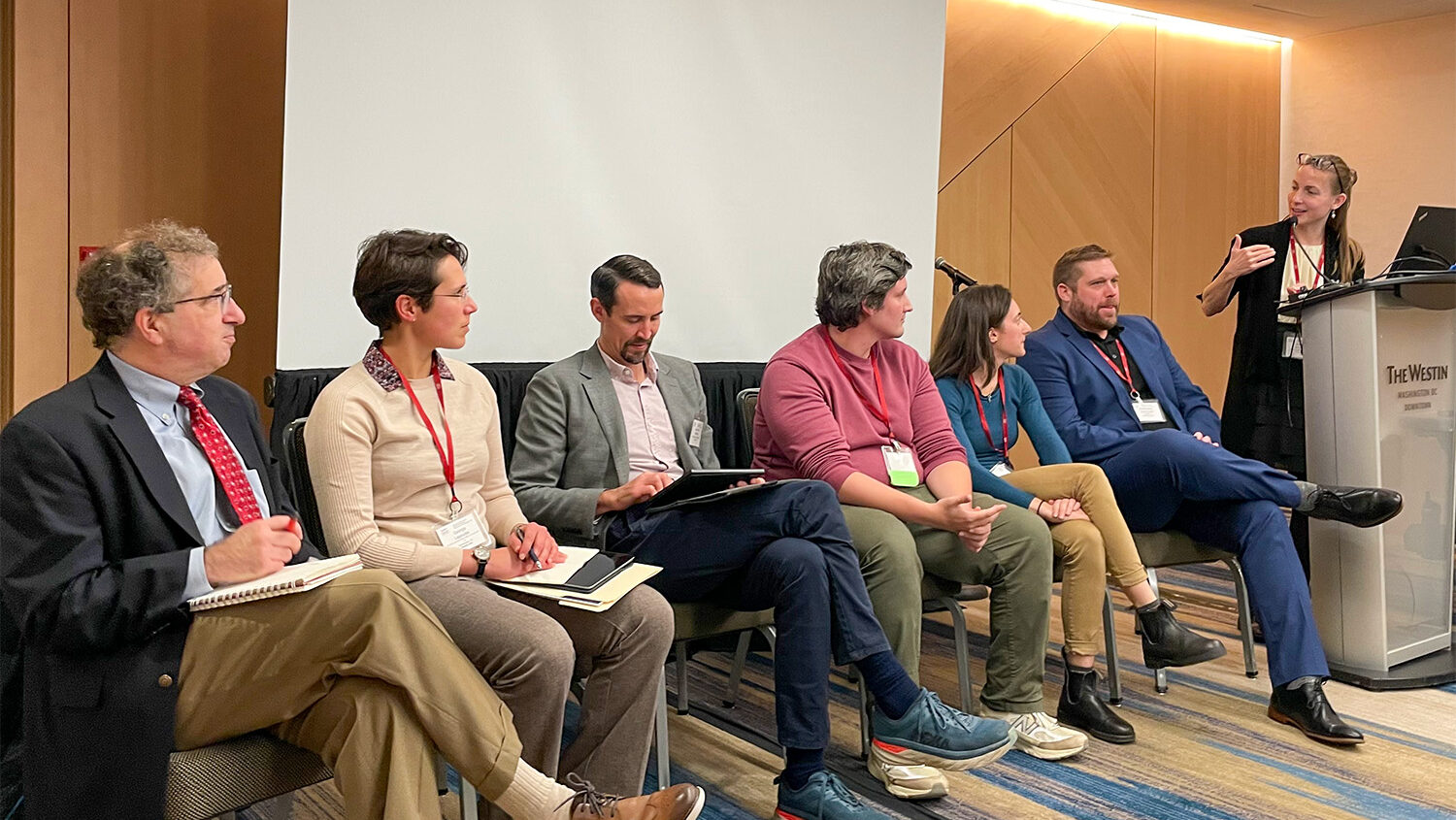
Blog: Interdisciplinary Reflections on the U.S. Executive Order on Advancing Biotechnology and the Bioeconomy
In December, GES-affiliated faculty and students participated in a roundtable discussion on the EO at the recent Society for Risk Analysis Annual Meeting, held in Washington, DC. The roundtable aimed to discuss the strengths and limitations of the recent EO on bio-innovation from interdisciplinary perspectives, highlighting aspects of biotechnology regulation and risk in particular.
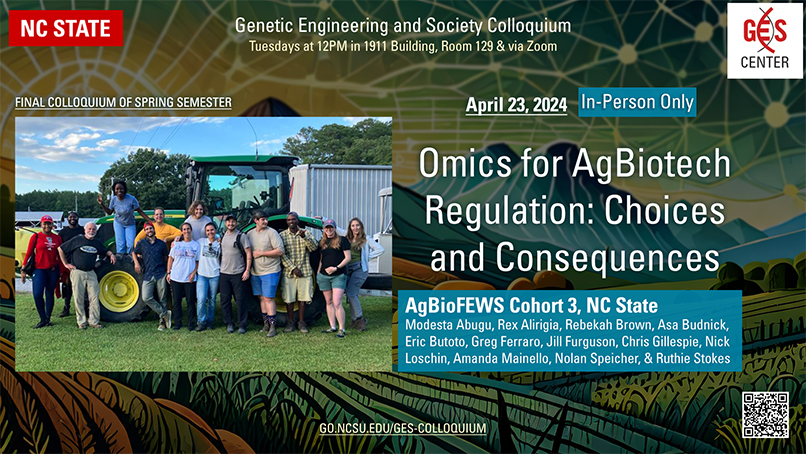
AgBioFEWS Cohort 3 – Omics for AgBiotech Regulation: Choices and Consequences | Final Spring GES Colloquium!
AgBioFEWS Cohort 3 discusses an ongoing interdisciplinary effort that seeks to better understand the implications of -omics technologies for regulatory oversight of agricultural products. IN-PERSON ONLY, NO ZOOM
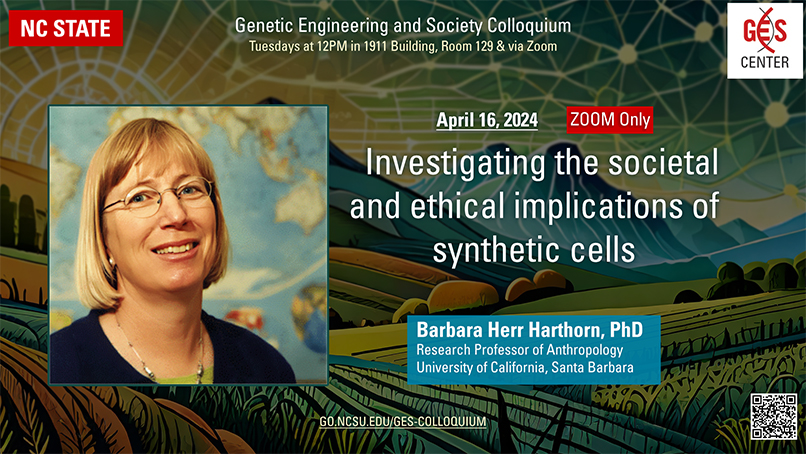
Barbara Herr Harthorn – Investigating the societal and ethical implications of synthetic cells [Zoom Only] | GES Colloquium
ZOOM ONLY. This talk introduces 3 ongoing NSF-funded collaborative interdisciplinary projects investigating US public and expert views on bottom-up synthetic cells using a responsible research and innovation framework.
There are multiple levels at which students can participate in AgBioFEWS.
We welcome students into the AgBioFEWS program as Cohort Fellows or students in a Graduate Minor, as well as opportunities for undergraduate participation. Students across all groups are eligible to apply for funds to support research and public engagement.
PhD Cohort Fellows
[Applications now closed] The most involved and advanced level, PhD Cohort Fellows receive fellowship support ($34,000 fellowship stipends with tuition and fees paid) and then move on to research and/or teaching assistantships in their PhD programs. Contact Program Coordinator: Dr. Dawn Rodriguez-Ward
Graduate Minor
Masters and PhD students working towards established graduate minor in Genetic Engineering and Society (GES), or in the emerging minor in Public Science (PS), may use 1-3 AgBioFEWS courses to fulfill requirements toward those minors. GES Minor contacts: Dr. Fred Gould and Dr. Jason Delborne
Undergraduate
Opportunities are being developed for undergraduate students to participate in AgBioFEWS. Undergrad contact: Dr. Nora Haenn
Partnerships and Opportunities
We will partner with North Carolina HBCUs, including North Carolina A&T State University, offering internships to their undergraduate and masters students, and we will establish a path for these students to join our NRT program. Continuous interaction with experts from industry, government, and NGOs will enable students to have access to a diversity of careers.
An Integrated Approach
AgBioFEWS students work together from differing perspectives to examine current and potential future biotechnology products and their development pathways to assess if and how they can be used to improve Food, Energy, and Water Systems for societal benefit.
To address societal challenges, scientific research must be convergent: driven by compelling problems and deeply integrating scientific disciplines. AgBioFEWS students gain this capacity by working collaboratively to research how agricultural biotechnology changes agricultural landscapes and rural communities, integrating tools and cultures from the natural and social sciences.
AgBioFEWS scholars not only think broadly, they use evidence-based approaches to elevate the level of public discourse on agricultural biotechnology.
Meet Our Faculty
The faculty leadership team brings expertise spanning genetic engineering, ecology, plant systems, synthetic biology, disease epidemiology, public engagement, risk analysis, bioeconomics, and more. This means that students from any of these disciplines will become T-shaped, adept at working with colleagues from any background.
Faculty Directory – Search “AgBioFEWS”Students can choose any faculty member in their designated PhD programs as an advisor or they can enter the program without a specific advisor and choose the advisor later.
Grand Challenges
Agriculture constitutes the largest use of land and water on the planet and as currently practiced could threaten the sustainability of FEW systems.
While biotechnologies are often portrayed to the public as either solving or causing these challenges, the implications of these technologies are complex, requiring a convergence of scientific fields and insights from the humanities to understand them. Our students cross disciplines to address these complex challenges.
AgBioFEWS is built on a foundation of interdisciplinarity, bridging insights from the natural sciences, social sciences, and humanities. Our program offers PhD and Masters students with interdisciplinary interests the chance to research, develop, appraise, utilize, manage and communicate agricultural biotechnology in ways that improve FEW systems. Our students:
- Integrate knowledge and recognize the assumptions in disparate fields of study,
- Understand how both facts and values influence decision-making, and
- Establish their trustworthiness through open and creative engagement with diverse communities.
PhD Options
NOTE: In order to be considered, students must also apply to one of these 35 PhD-granting programs at NC State for the upcoming 2021-2022 academic year.
[click to expand list]
College of Agriculture and Life Sciences (CALS):
| College of Education (CED):College of Humanities and Social Sciences (CHASS):College of Natural Resources (CNR): | College of Sciences (COS):
|
|---|
Coursework and Activities
Required Coursework
FEW Impacts of Biotechnology in NC Agricultural Systems
Timeframe: First and second summer, 3 credits
Faculty: Core and contributing faculty
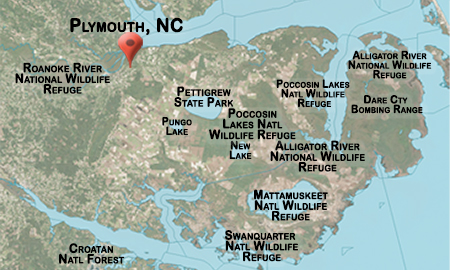
Study area in Eastern North Carolina
Description: Students will spend much of their first course in rural agricultural communities. Following an intensive 5-day overview of the agricultural systems in the region (on campus at NC State), students will travel to a small Coastal Plain community where they and faculty will spend a week visiting with farmers, hearing about how they are impacted by genetic engineering, and laboring in the fields at the Vernon James Research & Extension Center. They will also meet with environmental groups such as The Nature Conservancy, Toxic Free NC, and Sound Rivers, learning why and how they monitor water quality, and their concerns about how biotech crops affect fragile nature lands. The following spring, they will return for two more weeks to see cropping operations and decision-making done during that season.
After taking this course, students will have a basic understanding of:
- local farmer practices, decision-making, and concerns
- positive and negative impacts of engineered crops on FEW systems
- concerns of environmental groups and local citizens
- responsible and effective engagement with diverse publics
See 2019 Cohort presentation on their summer course experience
Emerging Technologies, Science Communication, and Public Engagement
Timeframe: Fall of first year, 3 credits
Faculty: Jason Delborne and Jean Goodwin
Description:This course will address the challenge of designing meaningful engagement among experts, stakeholders, and broader publics in the development and governance of emerging technologies. Students will integrate conceptual foundations from science communication, science and technology studies (STS), environmental policy, and science ethics, and will use this knowledge to develop practical program designs for students’ future public engagement activities on issues related to biotechnology innovations.
After taking this course students will:
- recognize the relationships among expertise, public trust, and adoption of emerging biotechnologies in agriculture
- understand science as a social process situated within ethical, cultural and policy contexts
- have developed a personal ethical framework for evaluating appropriate public roles and responsibilities as a researcher
- have a feasible, research-based plan for effective and appropriate public engagement activities
Genetic Engineering for Sustainable Crop Production
Timeframe: Spring of first year, 3 credits
Faculty: Heike Sederoff, Bob Kelly, and Fred Gould
Description: This course will provide students with an understanding of the genetic and molecular basis of plant physiology and the different technologies of genetic crop improvement. The students will learn the physiological effects of select genetic targets, synthetic modules, and interactive engineering. These concepts will then be analyzed for their utility, efficiency, and limitations in engineering plants with properties that could improve FEW systems. Case studies will be presented as examples of how current crops with engineered traits have affected FEW systems in the US and globally. The students will critically evaluate new discoveries in the natural sciences for their potential application in biotechnology. Students will learn basic molecular techniques (e.g. DNA/RNA extraction and purification, PCR) and biosafety protocols in a teaching lab. They will use bioinformatics to compare gene origins and compare gene structures. Multiple visits to active genetic engineering labs, greenhouses, and the NC State sequencing facility (Genomic Sciences Lab - GSL) will provide practical insight into the generation and analysis of engineered plants and associated microbes. Students will participate in demonstrations of cloning and transformation techniques. (Students lacking knowledge of genetics will take an introductory genetics course the semester prior to this course. Peer mentoring during the course by students in molecular genetics PhD programs will be encouraged as part of the team experience.)
After taking this course students will be able to:
- explain basic concepts of genetics, genomics and plant physiology
- understand how bioinformatics is used to analyze sequence data
- extract and quantify DNA/RNA, run PCR reactions, and compare sequences on databases
- describe characteristics of current, and potential future strategies for modifying plant genomes
- examine the FEW impacts of current commercial GE crops—as well as what is in the pipeline
- understand novel genetic approaches for improving FEW systems in the near and far future
Systems Modeling and Policy Analysis of Emerging Biotechnologies
Timeframe: Fall of second year, 3 credits
Faculty: Zack Brown, Jennifer Kuzma and Kelly Zering
Description: The complex feedbacks between agricultural biotechnology and FEW systems preclude the sole reliance on controlled experimentation or observational study to assess causal relationships across diverse systems. Assessing the possible futures implicated by these emerging technologies requires integrating modeling approaches. When strictly disciplinary models are applied to inherently interdisciplinary questions, the processes outside the modelers’ expertise are usually represented (if at all) in a highly abstract fashion, often with unjustified assumptions. For example, natural scientists and engineers assuming away behavioral responses to a new technology is a classic case of an unjustified assumption in an ‘outside process’ that can have tangible consequences (Mobarak et al. 2012). This course will engage students from multiple disciplines to combine their complementary expertise and interests to work together with instructors (either in small groups or as a class) on a single final project. With this group-based practicum format establishing the orientation of this course, we will interweave a limited number of discrete lectures by the instructors that provide self-contained primers of the types of models used in specific disciplines, including agronomy, population biology and ecology, economics, decision and risk analysis, and life-cycle assessment.
After taking this course students will know:
- the basics of common modeling techniques used across the biological, economic and social sciences (e.g. systems mapping, systems dynamics, agent-based modeling, optimization, risk analysis, and mind-mapping)
- how to assess the validity of different modeling techniques across disciplines
- how to identify suitable modeling techniques for different research questions, and based on different types of available data
- how to simplify complex systems to the key processes and feedbacks admitting analysis of a specific, interdisciplinary question
- how to analyze and account for uncertainty in model structure, parameters or assumptions (e.g. through Monte Carlo simulation, Bayesian approaches and expert elicitation, etc.), as well as the connections from natural-world “unknowns” to social-world forces that can address the uncertainties (e.g. funding policy, risk management, or changes in economic conditions)
- how to integrate and apply modeling techniques to analyze food, energy and water interactions with humans’ choices regarding emerging agricultural biotechnologies
Program Activities
Cohort Projects
Timeframe: Spring semester after last AgBioFEWS course
From the first day that the Cohort Students join our program they are made aware that a major goal in their convergent training is for them to use the background gained from disciplinary and AgBioFEWS coursework, as well as other sources, in order to work together on a project involving multiple disciplines. While we recognize that students in the cohorts have disciplinary emphases, this is not simply a multidisciplinary project where each student does work in his/her discipline. The goal is for all students to contribute to and understand all of the methods and outcomes of the project.
As students in a cohort move through hands-on and more conceptual courses, they are expected to keep their eyes out for interesting problems where solutions will require input from multiple disciplines. They are encouraged to discuss their ideas with AgBioFEWS faculty. At the end of their second Fall semester, the cohort chooses 2-3 faculty members to formally mentor them on their project.
The final project will be determined by the students. Given the emphasis of our AgBioFEWS on communication and engagement, examples of outcomes could be an innovative approach to engagement tested to determine if it elevates the level of public discussions about biotechnology and FEW systems, or an interactive systems model of an agricultural FEW system that is accurate, accessible, and informative to farmers and conservationists. A student cohort can also choose to work on more experimental or analytical work on farms and/or adjoining natural habitats.
Colloquium and Professional Development
Timeframe: Offered every Fall and Spring Semester, 1 credit
Faculty: Led by Zack Brown, with all faculty contributing
Description: AgBioFEWS students, at all levels, are provided with additional exposure to diverse perspectives on biotechnology in our ongoing, weekly colloquium series on Genetic Engineering and Society.
Presentations are kept to 30 minutes to allow for plenty of time for discussion. Many of the presenters are drawn from multinational corporations, governments, NGOs, and startup companies. These presenters are chosen to provide divergent viewpoints on a broad array of genetic engineering issues (from bacteria to humans) in order to challenge our students to think deeply for themselves. We are fortunate to have collaborations with many small and large biotechnology companies close to NC State (e.g. Syngenta, BASF, AgBiome). Nonprofits like the Nature Conservancy and RTI International are also nearby and will collaborate.
Collaborations between the NC State Graduate School, Libraries, and the Leadership in Public Science cluster will create numerous opportunities for our AgBioFEWS students to further develop their academic and public communication skills—these range from short workshops on science communication to full credit courses on grant-writing. In addition, NC State has a “Preparing the Professoriate” program for students aiming at academic careers. Traditional courses on research ethics are required in most of our associated graduate programs.
PhD Thesis
Although the AgBioFEWS Cohort Students will be receiving a PhD in an already established program with its own requirements, each Cohort Student (and PhD program Director of Graduate Programs) will sign a contract in joining the AgBioFEWS program indicating that at least one chapter from her/his thesis will address an interdisciplinary issue related to agricultural biotechnology and FEW systems.
Why NC State?
NC State is North Carolina’s flagship school, bringing together some of the world’s top agricultural and social scientists.
The Land Grant mission of NC State has always valued interdisciplinary interactions among agricultural scientists. Now, we are positioned to become a leader in moving from a technological, economic, commercialization model centered in the natural sciences and engineering to one that both embraces social sciences as an equal contributing partner and reaches out to engage the broader public.
NC State has institutionalized interdisciplinary research through the Chancellor’s Faculty Excellence Program, an initiative to create interdisciplinary clusters of faculty focused on addressing the world’s most pressing challenges.
The AgBioFEWS Program will engage with at least six of these faculty clusters: Genetic Engineering and Society, Global Environmental Change, Emerging Plant Diseases & Global Food Security, Water Sanitation & Hygiene, Public Science, and Systems & Synthetic Biology.
Archived: Recruitment Q&A Session
VIDEO: Q&A session with Dr. Fred Gould, GES Center co-director, and Dr. Dawn Rodriguez-Ward, AgBioFEWS program coordinator, recorded on Friday, December 10, 2021. The Zoom session started with a brief presentation of the AgBioFEWS program, ending with questions from applicants interested in applying to the program. Also available on the GES Lectures Podcast.
